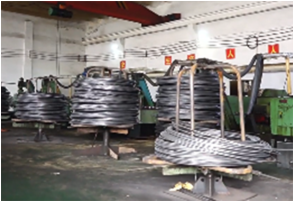Sep . 16, 2024 15:31 Back to list
304 stainless steel nuts
The Versatile Advantages of 304 Stainless Steel Nuts
When it comes to fastening solutions in various industrial and commercial applications, 304 stainless steel nuts have emerged as a popular choice among engineers, builders, and manufacturers. Renowned for their durability, strength, and resistance to corrosion, these nuts are indispensable components in countless assemblies and constructions. In this article, we will delve into the characteristics, benefits, and common uses of 304 stainless steel nuts.
Understanding 304 Stainless Steel
304 stainless steel is an austenitic grade of stainless steel, which is highly regarded for its excellent corrosion resistance and formability. Composed primarily of iron, chromium (18%), and nickel (8%), this alloy provides a balanced mix of strength, ductility, and resistance to oxidation. These properties make 304 stainless steel nuts suitable for numerous applications, particularly those exposed to harsh environments.
Key Characteristics
One of the standout features of 304 stainless steel nuts is their remarkable corrosion resistance. Unlike other materials that may corrode or degrade over time, 304 stainless steel maintains its integrity even in moist or chemically aggressive environments. This makes them ideal for applications in marine, food processing, and chemical industries.
Moreover, 304 stainless steel nuts exhibit excellent heat resistance, allowing them to withstand elevated temperatures without losing their strength. In addition, they are non-magnetic, which can be a critical consideration in specific applications, such as in electrical or sensitive electronic environments.
Benefits of Using 304 Stainless Steel Nuts
304 stainless steel nuts

The primary advantage of utilizing 304 stainless steel nuts lies in their longevity. These nuts do not rust or tarnish, ensuring that assemblies remain intact and functional over time. This durability reduces the need for frequent replacements and maintenance, translating to cost savings for businesses.
Furthermore, 304 stainless steel nuts offer exceptional mechanical properties. They provide a strong grip and can withstand heavy loads, making them suitable for high-tension applications. Their versatility allows them to be used in conjunction with various types of bolts and screws, expanding their suitability for a wide range of projects.
Another critical benefit is the ease of installation. 304 stainless steel nuts can be easily threaded onto bolts or screws, facilitating quick and efficient assembly. This ease of use is particularly beneficial in large-scale manufacturing environments where time and efficiency are paramount.
Common Applications
The applications of 304 stainless steel nuts are extensive. They are extensively used in the construction of buildings and bridges, where structural integrity is crucial. These nuts are also prevalent in the automotive industry, aiding in the assembly of vehicles with components that require reliability and strength.
In the food and beverage industry, 304 stainless steel nuts comply with health and safety standards, making them ideal for use in machinery that processes food. Furthermore, they are found in various household appliances, plumbing systems, and HVAC units, underscoring their versatility.
Conclusion
In summary, 304 stainless steel nuts are an essential component in numerous applications across various industries. Their outstanding corrosion resistance, mechanical strength, and thermal stability make them a reliable choice for both manufacturers and engineers. As industries continue to prioritize durability and efficiency, the popularity of 304 stainless steel nuts is likely to rise, solidifying their status as a staple in fastening solutions. Their characteristics not only ensure that structures and devices remain functional but also promote long-term sustainability in manufacturing processes.


